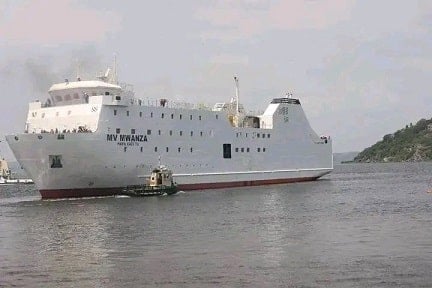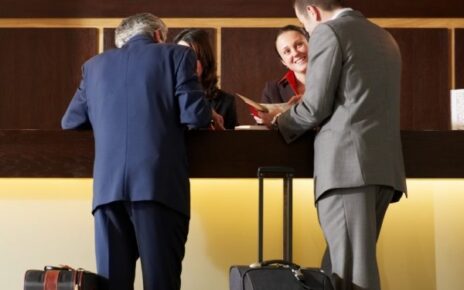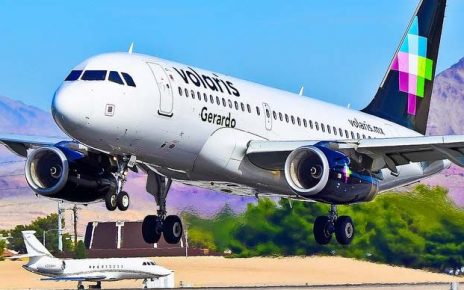The 3.5k GRT, 92.6 meter-long, 17-meter wide, and 20-meter-high vessel has a capacity of 1,200 passengers, 400 tons of cargo, 20 small vehicles, and 3 trucks. It was completed by 2 South Korean companies, Gas Entec and KangNam Corporation, after groundbreaking in 2019 at a cost of US$43 million.
After the final touches, the vessel will have a VVIP section for heads of state as well as regular VIP facilities including a first-class section with a capacity for 60 people, business class for 100 people, and second class for 200 people. The economy class shall have a capacity of 834 passengers. The vessel is equipped with an elevator, clinic, a disco, and a music band for entertainment.
The ship is expected to ply Lake Victoria, providing a key transport and trade network between Jinja and Port Bell in Uganda; Kisumu in Kenya; and Mwanza, Bukoba, Kemondo, and Musoma in Tanzania.
The trail blazing “MV Mwanza – Hapa Kazi Tu” which was the vision of Tanzania’s late President, John Pombe Magufuli, is a game changer for the East African region, plugging into the Standard Gauge Rail (SGR) between Dar es Salaam and Mwanza as well as across the East African region in general.
According to The East African weekly gazette, in 2019, the East African Community, at a joint ministerial meeting on strategy for Lake Victoria, integrated a transport program, which revealed that Lake Victoria’s transport infrastructure has the potential of generating US$60 billion worth of trade annually but currently only realizes around USD$6 billion for the 3 East African countries combined that share Lake Victoria.
Although 3.5k GRT is literally a drop in the ocean compared to ocean going cruise liners that tip the scales at up to 140k GR, for Lake Victoria which in its own right at 68,800 sq mm is almost 3.5 times the size of kingdom states like Eswatini, MV Mwanza-Hapa Kazi Tu has reawakened the potential of marine tourism in the East African hinterland which can be emulated by Uganda and Kenya.
Drawing from the colonial past, the development of marine transport is not a new phenomenon as it was inextricably linked to the construction of the Uganda Railway (more infamously renowned for the man-eating lions of Tsavo) starting in 1896 before reaching (Port Florence) Kisumu in 1901. Ostensibly, its construction was intended to protect British imperial interests in Egypt and beyond.
Early travelers to sail the hinterland lakes included Italian Prince Luigi Amadeo on the scientific expedition to the Ruwenzori Mountains in 1906, former British Prime Minister Sir Winston Spencer Churchill on his “African Journey in 1907,” former US President Theodore Roosevelt in 1909, and Ernest Hemingway, the famous 20th century writer, in the latter half of the 20th century.
The new vessel should be able to stimulate interest in the sister states driven by their governments.
They may follow in the footsteps of the aviation sector which witnessed the revival of national carriers in the airline sector including RwandAir and Air Tanzania, followed by Uganda Airlines, launched within the space of 5 years of each other driven by their respective presidents.
In the case of Uganda where a feasibility study was carried out for the revival of the national airline under the framework of the National Planning Authority and “Vision 2040” on the directive of the Presidential Economic Council, this led to the successful revival of Uganda Airlines in 2018.
After Uganda President Yoweri Kaguta Museveni has been invited by his counterpart Tanzanian President, “Mama” Samia Suluhu Hassan, to witness the launch of MV Mwanza Hapa Kazi Tu, he is bound to be marveled by the VVIP staterooms, and not to be out done, take up the gauntlet for a similar vessel for Uganda as he did with the national airline.
With a positive outcome of the feasibility for a similar Floatel (Floating Hotel), the vessel should set sail in the next few years. At a nominal cost, comparable to the cost of one of Uganda Airlines’ CRJ 900 Bombardier aircraft, this should be a “fait accompli.”
The feasibility would have to recommend that the vessel have hybrid-sustainable credentials including sustainable fuel for propulsion, the galley, and launderette, as well as solar paneling for lighting of cabins, dining and other public areas, heating, electronics, and waste management systems.
Businesses would then to feed into the supply chain of the vessel from the food and beverages department, housekeeping, entertainment, engineering, deck crew, and all perks that an average high-end hotel would require, complimented by a well-trained crew, from officers, pursers, servers, and merchandising, etcetera.
In the case of the new MV Mwanza, tour operators and travel agents should already position themselves to sell the state rooms (cabins) through integrating booking systems such as travelopro or versionix depending on what the vessel operator shall offer.
To augment the experience, tour operators should be ahead of the curve and begin to tailor itineraries originating, for example, from Kilimanjaro Airport to Ngorongoro Crater or Serengeti National Park in Tanzania before transferring to the home port of Mwanza,Tanzania, to board the overnight cruise to Port Bell in Uganda and then disembarking to a waiting ground handler, onward to the mountain gorillas in Bwindi or to “The Source of The Nile” sailing. The Port of Kisumu in Kenya would complete the East African cruise circuit, enabling seamless travel to Masai Mara and onward attractions.
In anticipation of the new vessel’s maiden voyage, Port Bell, Uganda, would have to transform itself from a shanty port characterized by petty traders.
The new port would need to be a modern facility worthy of an international port of entry, such as the Entebbe International Airport, with arrival and departure terminals, a VIP lounge to compliment the ship’s VIP staterooms, Duty Free, a restaurant, taxi service, shopping, long-term parking accommodation, and other spin offs that shall accrue from the refurbishment.
According to Alex Mbonye, CEO of Uganda Shippers Council, the Port Bell quay which is only 85 meters long by 50 meters wide, will have to be lengthened to accommodate the 96-meter-long vessel. He also recommends that the current depth below deck shall also have to be dredged from 3.5 meters to about 6 meters.





